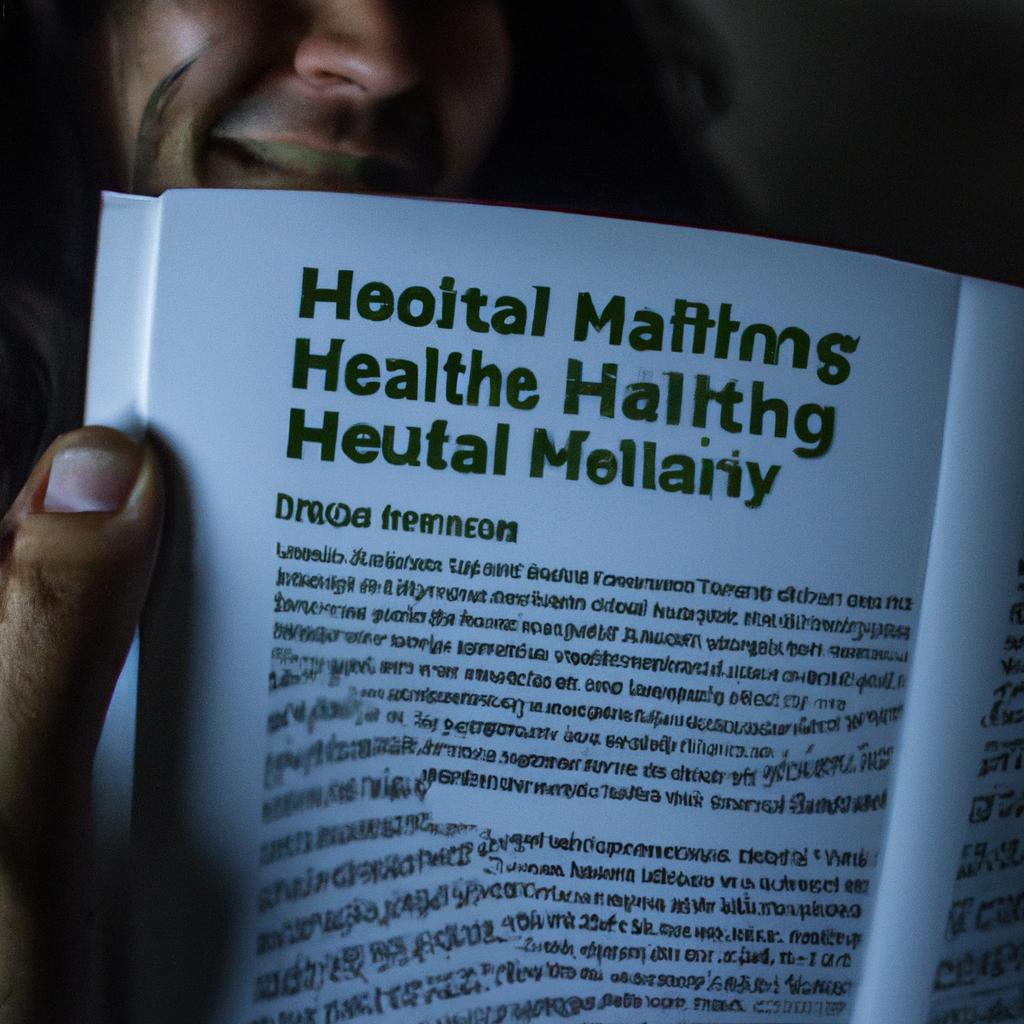Depression is a prevalent mental health condition that affects millions of individuals worldwide. It can manifest in various ways, making it crucial to recognize the signs and symptoms for early intervention and treatment. For instance, imagine a young adult named Sarah who has been feeling persistently sad and hopeless for several weeks. She has lost interest in activities she once enjoyed, struggles with concentration, experiences changes in appetite and sleep patterns, and often contemplates self-harm or suicide. In this article, we will explore the importance of recognizing these signs of depression through an academic lens, providing an invaluable guide to understanding and addressing this complex mental health issue.
Recognizing the signs of depression is vital as it allows individuals to seek appropriate help and support before their condition worsens. Depression encompasses a range of emotional, cognitive, behavioral, and physical symptoms that significantly impact one’s overall well-being. These signs may vary from person to person but commonly include persistent feelings of sadness, hopelessness or emptiness; loss of interest or pleasure in previously enjoyable activities such as socializing or hobbies; fatigue or lack of energy even after restful periods; difficulties concentrating or making decisions; disturbances in sleep patterns such as insomnia or excessive sleeping; significant weight loss or gain due to changes in appetite; recurrent recurrent thoughts of death, self-harm, or suicide.
It is important to note that experiencing one or two of these symptoms does not necessarily indicate clinical depression. However, when several of these symptoms persist for an extended period and significantly interfere with daily functioning, it may be indicative of a depressive episode.
Recognizing these signs is crucial because early intervention and treatment can greatly improve outcomes for individuals with depression. Research has shown that untreated depression can lead to severe impairment in various aspects of life, including work or school performance, relationships, physical health, and overall quality of life. Identifying the signs allows individuals to seek professional help from mental health providers who can provide appropriate interventions such as therapy, medication management, or a combination of both.
Furthermore, recognizing the signs of depression allows loved ones and support systems to offer assistance and understanding. Sometimes individuals with depression may struggle to reach out for help due to feelings of shame or stigma surrounding mental health issues. By being aware of the signs and approaching the individual with empathy and compassion, friends and family members can play a vital role in encouraging them to seek help.
In conclusion, recognizing the signs of depression is essential for early intervention and treatment. By understanding the range of emotional, cognitive, behavioral, and physical symptoms associated with depression, individuals can seek appropriate help before their condition worsens. Additionally, awareness among loved ones enables them to offer support and encouragement in seeking professional assistance. Together, we can create a more compassionate society that addresses mental health issues effectively and supports those affected by depression.
Understanding the symptoms of depression
Understanding the Symptoms of Depression
Depression is a complex mental health condition that affects millions of people worldwide. By recognizing its symptoms, individuals can seek appropriate support and treatment to manage their mental well-being effectively. For instance, Sarah, a 32-year-old woman struggling with depression, experienced persistent feelings of sadness and hopelessness for several months. These symptoms interfered with her daily life activities and made it challenging for her to maintain healthy relationships.
To gain a better understanding of depression’s symptoms, it is essential to be aware of the following signs:
- Persistent low mood: Individuals experiencing depression often feel sad or empty most days for an extended period.
- Loss of interest or pleasure: Engaging in activities once enjoyed may become uninteresting or joyless.
- Fatigue or loss of energy: Feelings of constant tiredness and lack of motivation are common among those with depression.
- Changes in appetite or weight: Some individuals may experience significant weight loss or gain due to alterations in their eating habits.
These symptoms serve as crucial indicators when assessing whether someone might be suffering from depression. To illustrate this further, consider the following table showcasing how these signs manifest in different people:
| Signs | John | Emily | Mark |
|---|---|---|---|
| Low Mood | Present | Present | Absent |
| Loss of Interest | Present | Absent | Present |
| Fatigue/Loss of Energy | Absent | Present | Present |
| Appetite/Weight Changes | Absent | Absent | Present |
Recognizing changes in sleep patterns is another important aspect when identifying potential symptoms associated with depression. Understanding these variations aids in implementing effective interventions and providing necessary support to individuals affected by this debilitating condition.
Recognizing changes in sleep patterns
Recognizing Changes in Sleep Patterns
Imagine a scenario where Sarah, a 30-year-old woman, has been feeling increasingly sad and unmotivated lately. She finds herself struggling to fall asleep at night and waking up much earlier than usual, even though she used to be able to sleep soundly through the night. This change in her sleep patterns is just one of the many signs that can indicate the presence of depression.
When it comes to recognizing changes in sleep patterns as potential symptoms of depression, there are several key indicators to consider:
- Insomnia: Individuals with depression often experience difficulty falling asleep or staying asleep throughout the night. They may find themselves lying awake for hours on end, their minds racing with negative thoughts and worries.
- Hypersomnia: On the other hand, some people with depression might actually sleep excessively, finding it difficult to get out of bed in the morning despite having had adequate rest.
- Early morning awakening: Waking up significantly earlier than usual without being able to go back to sleep is another common sign associated with depressive episodes.
- Disrupted circadian rhythm: Depression can disrupt an individual’s internal body clock, leading to irregular sleeping patterns that deviate from their normal routine.
To further illustrate these changes in sleep patterns commonly seen in individuals with depression, consider the following table:
| Sleep Pattern | Description |
|---|---|
| Insomnia | Difficulty falling asleep or staying asleep |
| Hypersomnia | Excessive daytime sleepiness |
| Early awakening | Waking up much earlier than intended |
| Circadian | Irregularities in the natural sleep-wake cycle |
Understanding these changes in sleep patterns is crucial because they serve as important red flags for identifying underlying mental health concerns such as depression. By paying attention to shifts in how we sleep and acknowledging their potential significance, we become better equipped to recognize possible signs of depression and seek appropriate help.
Transitioning into the subsequent section about “Identifying loss of interest or pleasure in activities,” it is important to note that changes in sleep patterns often go hand-in-hand with other symptoms of depression. Recognizing these interconnected signs can provide a more comprehensive understanding of an individual’s mental well-being.
Identifying loss of interest or pleasure in activities
Recognizing Signs of Depression: A Mental Health Guide
Example:
For instance, consider Sarah, who used to find solace and joy in painting landscapes during her free time. Lately, however, she has been unable to muster the motivation required to pick up her paintbrushes. Even when she tries engaging in artistic pursuits, they no longer bring her the fulfillment they once did.
Identifying loss of interest or pleasure in activities can be challenging but crucial for early intervention and support. Here are some common signs associated with this symptom:
- Diminished involvement in previously enjoyable activities.
- Persistent boredom and disinterest.
- Difficulty concentrating on tasks due to lack of engagement.
- Avoidance or withdrawal from social interactions.
By recognizing these indicators, one can better understand if there has been a notable decline in their level of enjoyment for activities that were once fulfilling. It is essential to remember that experiencing occasional disinterest may not necessarily indicate depression; however, persistent feelings of emptiness or a consistent pattern of avoiding pleasurable activities might warrant seeking professional help.
To illustrate how significant this sign can be, let’s take a look at the following table showcasing different scenarios:
| Scenario | Activity | Level of Interest |
|---|---|---|
| Scenario 1 | Going out for walks | High |
| Scenario 2 | Watching movies | Moderate |
| Scenario 3 | Attending parties | Low |
| Scenario 4 | Reading books | None |
As seen in the table, when there is a decline or absence of interest across various activities, it may point towards a potential depressive episode. This loss can significantly impact an individual’s overall quality of life and should not be overlooked.
In continuation with our exploration of signs related to depression, we will now discuss how changes in appetite or weight can serve as indicators for further evaluation by healthcare professionals. By paying close attention to these subtle variations, one can gain valuable insights into an individual’s mental well-being and provide appropriate support if needed.
Understanding the connection between mental health and physical manifestations like appetite or weight changes is crucial. Hence, let us now delve into recognizing these signals without delay.
Noticing changes in appetite or weight
Identifying changes in appetite or weight can be another important indicator when recognizing signs of depression. For instance, let’s consider the case of Sarah, a 32-year-old woman who has been experiencing symptoms of depression for several months. Previously an avid food lover, Sarah now finds herself lacking interest in eating and has noticed a significant decrease in her appetite. As a result, she has unintentionally lost around 10 pounds over the past few weeks.
When it comes to changes in appetite or weight as potential signs of depression, there are several key factors to keep in mind:
- Significant increase or decrease: Individuals may experience either a considerable reduction or sudden increase in their appetite. Some people with depression might lose all desire to eat, while others may turn to food as a form of emotional comfort and engage in excessive eating.
- Unexplained weight loss or gain: Depression-related fluctuations in appetite often lead to noticeable changes on the scale. Drastic shifts in weight without any apparent cause should not be overlooked and could indicate underlying mental health issues.
- Psychomotor agitation or retardation: Alongside changes in appetite, individuals struggling with depression may also exhibit alterations in physical activity levels. Some may become restless and agitated (psychomotor agitation), while others may experience slowed movements and lethargy (psychomotor retardation).
- Body image concerns: Depressive episodes can significantly impact one’s perception of body image, leading individuals to develop negative thoughts about their appearance even if there have been no substantial changes.
To further illustrate these points visually:
| Signs of Changes | Associated Behaviors |
|---|---|
| Increase in appetite | Emotional eating habits |
| Decrease in appetite | Loss of interest towards food |
| Weight gain | Use food as coping mechanism |
| Weight loss | Reduced motivation to eat |
It is crucial to remember that everyone’s experience with depression is unique; thus, not all individuals will exhibit the same changes in appetite or weight. However, recognizing these signs can be a helpful step in identifying potential depressive symptoms and seeking appropriate support.
Transitioning into our next section about recognizing feelings of hopelessness or worthlessness, it is important to understand that changes in appetite or weight are often interconnected with other emotional indicators of depression. By considering multiple aspects, we can gain a more comprehensive understanding of an individual’s mental health state and provide them with the necessary resources for assistance.
Recognizing feelings of hopelessness or worthlessness
Recognizing Signs of Depression: A Mental Health Guide
In addition to changes in appetite and weight, another important sign of depression is recognizing feelings of hopelessness or worthlessness. These emotional experiences can be indicators that an individual may be struggling with depression. By understanding and identifying these signs, we can help individuals seek appropriate support and treatment.
Recognizing feelings of hopelessness or worthlessness:
One example that highlights the impact of feeling hopeless or worthless involves a hypothetical case study. Sarah, a 35-year-old woman, has been experiencing persistent feelings of hopelessness for several weeks. She constantly questions her self-worth and believes she is incapable of achieving anything meaningful in life. This sense of worthlessness has caused her to withdraw from social activities, neglect personal relationships, and lose interest in hobbies she once enjoyed.
To further understand this aspect, it is crucial to recognize specific signs associated with feelings of hopelessness or worthlessness:
- Pervasive negative thoughts about oneself
- Believing that one’s future holds no promise
- Feeling overwhelmed by daily tasks due to lack of motivation
- Loss of interest in previously enjoyable activities
By observing these signs, we can gain valuable insights into someone’s mental state and potentially offer them the necessary guidance and support they need.
The following table illustrates some common behaviors and emotions related to this topic:
| Behaviors | Emotions |
|---|---|
| Isolation | Despair |
| Self-criticism | Worthlessness |
| Lack of motivation | Hopelessness |
| Neglecting responsibilities | Helplessness |
These examples only scratch the surface but provide a glimpse into what someone might experience when grappling with feelings of hopelessness or worthlessness.
Identifying persistent feelings of sadness or emptiness:
Moving on from recognizing feelings of hopelessness or worthlessness, it is essential to address the presence of persistent feelings of sadness or emptiness. These emotions can often be overwhelming, affecting an individual’s overall well-being and quality of life. Understanding how these feelings manifest is crucial in supporting someone who may be dealing with depression.
With a foundation in recognizing feelings of hopelessness or worthlessness, we can now delve into identifying persistent feelings of sadness or emptiness as another significant sign of depression. By paying attention to these signs, we can better understand the emotional struggles individuals face and offer them appropriate assistance in their journey towards recovery.
Identifying persistent feelings of sadness or emptiness
Recognizing Signs of Depression: A Mental Health Guide
Building upon our understanding of recognizing feelings of hopelessness or worthlessness, it is crucial to further explore another significant indicator of depression – persistent feelings of sadness or emptiness. By examining this aspect, individuals can gain deeper insights into their emotional state and seek appropriate support for their mental well-being.
Paragraph 1:
Consider a hypothetical case study involving Sarah, a young professional who has recently experienced a series of personal setbacks. Despite her achievements in various areas of life, she finds herself trapped within an overwhelming cloud of sorrow and apathy that seems never-ending. Such prolonged periods of sadness are one key symptom indicating potential depressive tendencies. It is important to note that these feelings persist even when external circumstances may not warrant such emotions.
Paragraph 2:
To provide further clarity on identifying persistent feelings of sadness or emptiness, let us consider some common signs associated with this particular facet of depression:
- Loss of interest in activities previously enjoyed
- Decreased energy levels and fatigue
- Difficulty concentrating or making decisions
- Changes in appetite or weight loss/gain
By observing these symptoms collectively, individuals can begin to discern patterns indicative of depression. Acknowledging these signs allows one to take proactive steps towards seeking assistance and finding effective coping mechanisms.
Emotional Bullet Point List (in markdown format):
The impact of persistent feelings of sadness or emptiness cannot be underestimated. Consider the following emotional tolls often experienced by those grappling with depression:
- Overwhelming sense of despair
- Isolation and detachment from loved ones
- Diminished self-esteem and confidence
- Increased risk for suicidal thoughts or behaviors
These emotional consequences highlight the urgency surrounding early recognition and intervention in order to minimize the debilitating effects that depression can have on an individual’s overall quality of life.
Emotional Table (in markdown format):
| Emotional Consequences | Examples |
|---|---|
| Overwhelming despair | Feeling as though life has lost all meaning and purpose. |
| Isolation | Withdrawing from social activities, leading to a sense of disconnection from others. |
| Diminished self-esteem | Persistent negative thoughts about oneself, feeling unworthy or unloved. |
| Suicidal ideation | Contemplating ending one’s own life as a result of overwhelming emotional pain. |
Paragraph 3:
By recognizing the signs associated with persistent feelings of sadness or emptiness, individuals can gain valuable insights into their mental well-being. It is essential to remember that depression is not merely a temporary bout of sadness but rather a complex condition that requires attention and support. Through early identification, individuals can seek appropriate help, embark on a journey towards recovery, and regain control over their emotional state.
Note: In conclusion or Finally




